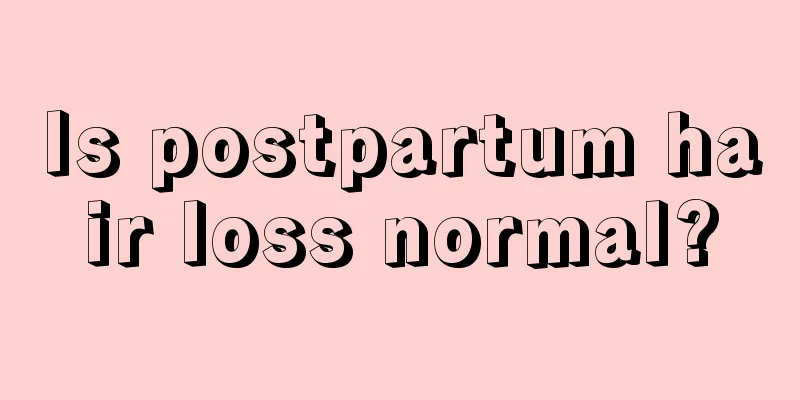Is postpartum hair loss normal?

|
Generally, mothers may find some adverse reactions in their bodies after giving birth, especially hair loss. Many mothers are quite nervous about the phenomenon of hair loss, because hair loss will definitely affect your image. In fact, postpartum hair loss is relatively normal, because the body function of the mother declines after giving birth, and the body has not fully recovered, so it will cause this phenomenon. Then, let’s follow the editor to understand the specific reasons. Causes of hair loss in postpartum mothers 1. Decreased estrogen levels: The lifespan of hair is related to the level of estrogen in the body. During pregnancy, the mother's estrogen level rises, and the hair not only becomes thicker but also lives longer, most of the time exceeding the normal metabolic cycle of hair. After giving birth, the estrogen level in the mother's body decreases, and the hair that exceeds the normal metabolic cycle will fall out. 2. Poor nutrient absorption: Postpartum mothers have weak spleen and stomach, and it is easy for them to absorb insufficient nutrients. Correspondingly, the hair will be insufficiently supplied with nutrients, and hair loss is inevitable. In addition, slow blood circulation and poor nutrient delivery after childbirth also lead to insufficient nutrient supply to the scalp and easy hair loss. 3. Postpartum mental problems: If a mother is overly anxious or depressed after giving birth, it is easy to cause nervous disorders, resulting in insufficient blood supply to the scalp, which can cause hair loss. How to deal with postpartum hair 1. Relax. Mothers should not be too anxious when facing hair loss. Postpartum hair loss is a normal metabolic process. The fallen hair will soon be replaced by new hair, and the mother's hair will not become thinner and thinner. 2. Eat a balanced diet. Postpartum mothers should not be picky about food nor go on a diet excessively. Their diet should be a combination of coarse and fine foods, and the staple foods, vegetables, and fruits should also be distributed evenly. In addition, Polygonum multiflorum, black sesame and angelica are all beneficial to hair and can be added to your daily diet. After understanding the specific reasons for postpartum hair loss, you don’t have to be so nervous. In daily life, you can also eat some sesame seeds frequently, because sesame seeds can play a good role in maintaining hair. In addition, you must pay attention to avoid excessive washing of your hair after delivery. If you wash your hair frequently, not only will your hair fall out, but you will also catch a cold. |
<<: How can I check whether ovulation is normal?
>>: What causes poor follicular development?
Recommend
Why do we use mugwort leaves to bathe during the Dragon Boat Festival? What should we pay attention to when using mugwort leaves to bathe during the Dragon Boat Festival?
The Dragon Boat Festival generally refers to the ...
What are the methods for women to nourish the kidneys?
Generally speaking, when people talk about kidney...
Can you get pregnant during menstruation?
Generally speaking, the menstrual period, includi...
[Medical Q&A] How to prevent psoriatic arthritis?
Planner: Chinese Medical Association Reviewer: Ji...
If a pregnant woman has itching, it means she has a boy.
I believe that many pregnant mothers have many di...
Will women's private parts turn black if they do it too much?
Many women are troubled by the darkening of their...
Female inguinal lymph node location map
The inguinal lymph nodes are located on the inner...
Can I still get pregnant after having my fallopian tube removed on one side?
Due to some gynecological tumors or serious gynec...
What are the symptoms of breast lipoma?
Lipoma is a disease caused by adipose tissue, but...
If you can’t sleep, don’t force yourself to sleep. Try these methods!
About one-third of our lives are spent sleeping, ...
Behind a banner
This is the 4235th article of Da Yi Xiao Hu A mom...
What are the dangers of inferior eye shadow?
As we all know, there are many kinds of eye shado...
Is it okay to have a 41-day abortion with pills?
Medical abortion is one of the main choices for m...
Pregnancy test paper picture boy
Many women want to know whether they are pregnant...
Don't do these 4 "eye-damaging" behaviors! If you don't pay attention, your eyes will really be "scrapped"
Reading reminder: This article contains 12 pictur...









